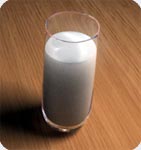Milk and Water are Essential for all Players
Injuries are a part of sports but we believe that we must do our best to keep them at a minimum. Strong bones and muscles are a must for any player. Strong bones are built from a healthy balanced diet along with plenty of milk. Milk is one of the richest sources of calcium to our bodies. All research shows that there is no short cut to strong bones. You can’t do any magic, you can’t just pop a calcium pill, you just have to commit yourself to consuming milk or curd daily. During the period of time, when I was a Sports Nutritionist to the NCA, we have observed that a player must have a minimum of 800 –1000ml skimmed milk/curd daily. You may do this at home, but while touring or during heavy match schedules we see that this could be neglected. If it happens for 2-3 days it may be negligible, but for 3-4 weeks on a tour if you are haphazard about your milk intake then you could have your bones getting brittle and a fracture or a crack may take place very easily. Muscle and ligament injuries may also occur. Kindly note that all muscle contractions are also affected by calcium levels and therefore your whole body ‘s muscular performance may come down.
 |
Secondly milk/curd in a player’s diet is supposed to provide about 1/3 of the total protein requirement for a day. This protein is important to keep the muscle mass up and muscles strong. When the milk intake goes down we could see the muscle performance badly affected. Every day during training and playing huge muscle tissue breakdown takes place and this has to be rebuilt daily. If the protein intake is poor, not only does the muscle mass go down, weak muscles will tear and get pulled easily. Try to drink a glass of skimmed milk with a banana on rising, you may add bournvita, Horlicks, or a spoon of sugar to it. Try to have one more glass with breakfast, may be with cereal.
Have atleast ˝ -1 C yogurt with lunch and dinner. At 6 pm when you finish play or after training, drink a milk shake or lassi. If this is not possible make sure you drink a glass of milk at bedtime. 4-5 glasses (200ml each) skimmed milk/curd are a must daily.
Another leading cause for injury is high levels of uric acid in the blood. Uric acid is a waste product of protein breakdown in the body. It has to be flushed out of the blood daily with plenty of water. All players breakdown their own body muscle while training and playing. Also most of them consume a lot of protein in their diets. Many of them over do their chicken or red meat intake believing that this alone can make strong muscles. Therefore a players kidneys work overtime to flush out waste products like uric acid and urea. This has to be aided by a high intake of water. Any player drinking less than 3-4 liters water can have a serious problem. Please note on a match day you may sweat more so you have to consciously drink more. This may not happen with the tight schedule and tension.
The result is the uric acid in the blood goes up and it crystallizes. These crystals then get stuck in the joints that are being used heavily –toes, fingers, wrists, shoulders, ankles, elbows, and knees. This can cause shooting pain or a dull ache and destroy and ruin your performance.
In many cases we see that some players may even be genetically more prone to this problem so even a vegetarian can have this problem. Sometimes an attack of pain can follow a night of overeating – feasting, or a day of skipped meals- fasting or even a night of excess beer drinking.
Advice
- Firstly I would advice all players to do a simple random blood test asking for urea and uric acid levels to be tested. Urea is also a waste product, the levels should be less than 28 mgms% and in case of uric acid less than 6 mgms%.
- Consciously drink plenty of water 3- 4 liters daily.
- Restrict the intake of red meat and chicken/fish, not more than 2-3 pieces at one time in a meal. Restrict intake of non-veg gravies and non-veg soups.
- Use 800 ml-1 liter skimmed milk plus 2 egg whites daily to keep protein intake up. (They are safe and don’t cause a uric acid problem.)
- Strictly control alcohol intake or avoid it.
|